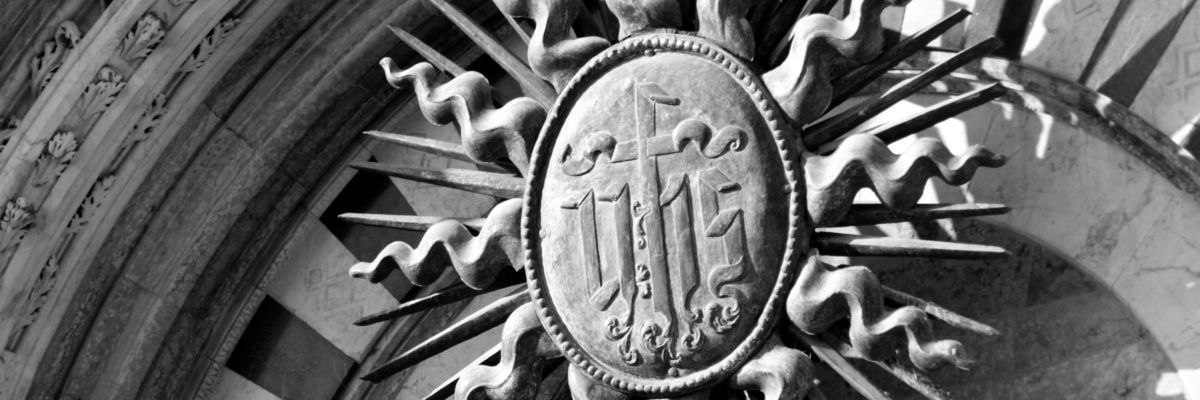
There are many terms floating around to describe the Mass— the Eucharist, the Mass, the liturgy, Holy Communion, the Blessed Sacrament, the breaking of the bread, and the Lord’s Supper. Do they all refer to the same thing?
In fact, all these words generally refer to the same reality: the body and blood of the Lord offered in sacrifice under the appearances of bread and wine in an act of public worship that glorifies God and obtains graces, and whose presence remains after the sacrifice is completed as spiritual food for the faithful who adore. But they differ slightly according to the aspects of the mystery they refer to.
Eucharist, which is the most inclusive word, implies all the aspects and effects of this mystery by naming its principal effect—the glorification of God. It comes from a Greek word that means “giving thanks,” or more precisely, the recognition of a good gift. It alludes to the prayer of Our Lord, who, lifting his eyes to heaven, gave thanks and broke the bread as he spoke the words of consecration: “This is my body . . . this is the chalice of my blood.”
Mass refers to the absolute essence of the Eucharist as a sacrifice—that is, the consecration of the body and blood of Christ and the completion of the sacrifice by the priest who accomplishes the consecration. The word comes from the Latin word missa, which refers to a thing being sent or offered up. The term developed from the people hearing the final admonition of the service, “Go, it has been sent up”—Ite, missa est. These are still the words use when the Mass is celebrated in Latin. The churches of the Syriac tradition in the Middle East and southern India have a similar expression. They call the Mass the Qrbana, or “what is offered up.”
Liturgy refers to the public and communally celebrated aspect of the Eucharist as worship. It comes from an ancient Greek word meaning public service, and so came to refer to the principal public and communal duty of the priests and people of the Church: the worship of God. Many of the Eastern churches use this term as their most common name for their rite of the Mass, calling it the “Divine Liturgy.”
Holy Communion refers to the sharing in the sacrifice of the body and blood of the Lord by eating and drinking the outward appearances of bread or wine that convey the real presence of his same body and blood. This name refers to the purpose of the mystery as an individually received reality: union with God by charity, which is the truest nourishment of the soul, and a token of future resurrection after death. This is what the Lord promises in the sixth chapter of St. John’s Gospel: “He who eats me will live because of me” (6:57).
Blessed sacrament refers to this reality as the greatest and most perfect of the seven sacraments of the New Law, and as the fulfillment of the sacraments of the Old Law. Sacrament comes from a Latin word that referred to the oath of allegiance imposed on soldiers in the Roman army. These obligations were indicated by words and even by a small branding of the flesh by a mark. The term was extended to mean other obligations, some secret or mysterious, and so was adopted by ancient Christians to refer to the sacred rites instituted by Christ. Thus, sacrament refers to the most universal aspect of the Mass: the way it conveys divine realities by an outward sign and sacred words. The Eastern churches do not use this word in their original languages, preferring to use the word mystery, taken from the rites of initiation of ancient religion. The idea behind the terms, however, is the same.
The Lord’s Supper refers to the first time the Mass was offered, by Christ himself in the Upper Room with his disciples on the night before he suffered. He gave his body and blood in sacrifice under the appearances of bread and wine, just as he was to offer them on the altar of the cross the next day. The Lord is said to have “instituted” the Eucharist by showing the essential elements of celebrating it, by commanding us to do so in the future, and in this way by instituting the Christian priesthood among the apostles whose highest duty would be the offering of the holy Mass. It is important to recognize that our Mass is not a commemoration of the Last Supper, except, in a sense, on Holy Thursday, when that event is recalled. Rather, it is a commemoration of the sacrifice of Calvary offered the next day.
The breaking of the bread is perhaps the oldest Christian name for the Mass. It is especially beloved to St. Luke, who uses it in his Gospel and in the Acts of the Apostles. This expression refers to the gesture of sharing the sacred species (the body and blood under the appearance of bread and wine) in Holy Communion, a time when the unity of the Church is especially evoked: our union with him as the head of his body, and our unity with each other in him. It is in this sense that St. Thomas Aquinas teaches that ecclesiastical unity is the principal effect of the holy Mass.
Now you have an idea of the vocabulary for expressing the reality of the holy sacrifice of the Mass. So what’s next? Ite!
If you liked this article, you can find more in our new 20 Answers booklet “The Mass,” now available for purchase at the Catholic Answers shop.



